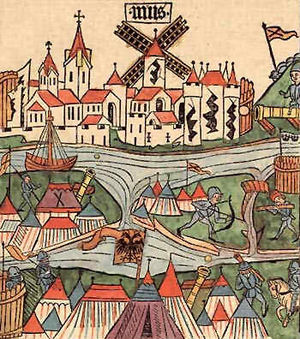
Back Belagerung von Neuss ALS Belagerung von Neuss German Asedio de Neuss Spanish Siège de Neuss French Neuss ostroma Hungarian Assedio di Neuss Italian Beleg van Neuss Dutch Oblężenie Neuss Polish Осада Нойса Russian
This article needs additional citations for verification. (November 2024) |
| Siege of Neuss | |||||||
|---|---|---|---|---|---|---|---|
| Part of the Burgundian Wars | |||||||
 The Siege of Neuss, from Geschichte Peter Hagenbachs und der Burgunderkriege (1477) by Konrad Pfettisheim | |||||||
| |||||||
| Belligerents | |||||||
| Burgundian StateElectorate of CologneElectorate of the PalatinateDuchy of GueldersDuchy of Cleves–MarkDuchy of Jülich-BergSavoyard mercenariesEnglish archers | Imperial City of CologneaImperial army | ||||||
| Commanders and leaders | |||||||
|
Charles the Bold, Duke of BurgundyFrederick I, Elector PalatineGerhard VII, Duke of Jülich-Berg |
Herman of Hesse, Administrator of CologneFrederick III, Holy Roman Emperor | ||||||
| a: Cologne had been effectively independent of the Archbishopric-Electorate since the Battle of Worringen in 1288, but did not become de jure independent until granted Imperial immediacy in the aftermath of this siege. | |||||||
The siege of Neuss, from 1474–75,[1] was linked to the Cologne Diocesan Feud and part of the Burgundian Wars. The siege, led by Charles the Bold against the Imperial City of Neuss, was unsuccessful. Charles was compelled by the approach of a powerful Imperial army to raise the siege.
- ^ "Die Belagerung Ahrweilers 1474 — Episode aus der Kölner Stiftsfehde". Archived from the original on 2016-03-03. Retrieved 2009-01-05.